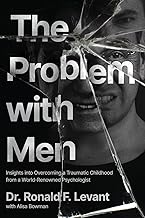The Problem with Men: Insights on Overcoming a Traumatic Childhood from a World-Renowned Psychologist by Dr. Ronald Levant with Alisa Bowman; Köehlerbooks; (c) 2024; ISBN 9798888-244302; 304 pages, $19.95.
By Michael R. Mantell, Ph.D.

 EL CAJON, California — Think you’ve got problems? Think they cannot be overcome? Then this is a book of hope for you if you want to learn how to disturb yourself less over a childhood with difficulties. The author of the book describes his childhood marked by beatings and fear, an adolescence defined by drinking, precocious sex, delinquent behavior, and depression.
EL CAJON, California — Think you’ve got problems? Think they cannot be overcome? Then this is a book of hope for you if you want to learn how to disturb yourself less over a childhood with difficulties. The author of the book describes his childhood marked by beatings and fear, an adolescence defined by drinking, precocious sex, delinquent behavior, and depression.
Dr. Levant, a renowned psychologist, delves into the underlying emotional and psychological challenges that many men face in contemporary society. He addresses the traditional notions of masculinity that often compel men to suppress emotions, leading to detrimental effects on mental health and interpersonal relationships. The book provides insights into overcoming these stereotypes and encourages men to engage in healthier emotional expression and vulnerability.
Levant describes how rigid definitions of “masculinity” may have adverse effects on men, influencing their ability to communicate emotions, form healthy relationships, and seek help for mental health issues. From a traditional Jewish perspective, where conventional masculinity often aligns with being a protector, provider, and authority within the home, Levant’s arguments resonate and challenge us to consider the implications of these roles.
One of the core points raised by Levant is the societal teaching that discourages men from expressing vulnerability or seeking emotional help. In Orthodox Jewish teachings, while there is an acknowledgment of the importance of strength and resilience in fulfilling one’s duties, there is also a strong basis for recognizing and addressing one’s emotional struggles. Our rabbinic teachings encourage individuals to support one another in times of distress.
For instance, Proverbs 27:17 states, “Iron sharpens iron,” underscoring the value of mutual support among men. Levant advocates for the acceptance of vulnerability as a strength rather than a weakness. From a contemporary psychological perspective, fostering a mindset that permits emotional expression can help alleviate feelings of shame and inadequacy that many men experience. This shift in belief can lead to improved mental health outcomes and deeper connections in personal relationships.
Levant’s exploration into how traditional masculinity can evoke feelings of inadequacy and frustration aligns with Jewish views of the family structure. In many traditional Jewish communities, men are often seen as the spiritual heads of their families and are expected to model behavior that reflects dignity, strength, and moral integrity. Levant’s insights about the dangers of these expectations additionally reminds us of the importance of empathy, kindness, and vulnerability within family dynamics.
The Talmud emphasizes that a wise man learns from everyone; thus, men wisely not only embody strength but would be wise to also demonstrate compassion and emotional connectivity in their roles as fathers and husbands. The traditional view in Judaism similarly encourages men to embody compassion and emotional engagement in their roles, thereby promoting healthier family dynamics and personal connections.
Levant draws attention to the necessity of evolving one’s understanding of masculinity, especially considering many contemporary challenges we all face in life. He argues that rigid gender norms contribute to a variety of psychological issues among men, including stress, anxiety, and depression. The pressure to conform to an ideal of masculinity often leads men to adopt maladaptive coping strategies, further compounding their mental health issues.
Movements toward healthier emotional expressions, as described by Levant, can find their grounding in Jewish teachings that advocate for the pursuit of wisdom and understanding, as suggested in Ecclesiastes 7:19: “Wisdom makes one wise man more powerful than ten rulers in a city.”
The Problem with Men serves as an illuminating resource for understanding the modern challenges men face in embodying masculinity. While our traditional teachings emphasize resilience and individual strength, they also advocate for mutual support, empathy, and emotional honesty. As Jewish men navigate our own identities, it is essential that we embrace the insights provided by Levant, learning to balance our traditions with the evolving discourse around masculinity, ultimately promoting mental health and emotional well-being within our families and communities.
The honesty, empathy and expert insights shared by the author offers many important takeaway lessons on tough topics such as childhood trauma, depression, suicidal thinking, substance abuse and addiction, restrictive gender stereotypes and expectations, relationship dynamics, and family conflict and violence.
Levant has opened a crucial and frankly hard-hitting and candid dialogue that invites reflection and action, encouraging all men, regardless of their backgrounds, to seek a more compassionate and supportive approach to masculinity. It is imperative that we, as a community, foster an environment where men feel safe to share their struggles, thereby redefining masculinity in a way that honors both our traditions and the realities of contemporary life.
*
Michael R. Mantell, Ph.D., prepares a weekly D’var Torah for Young Israel of San Diego, where he and his family are members. They are also active members of Congregation Adat Yeshurun.